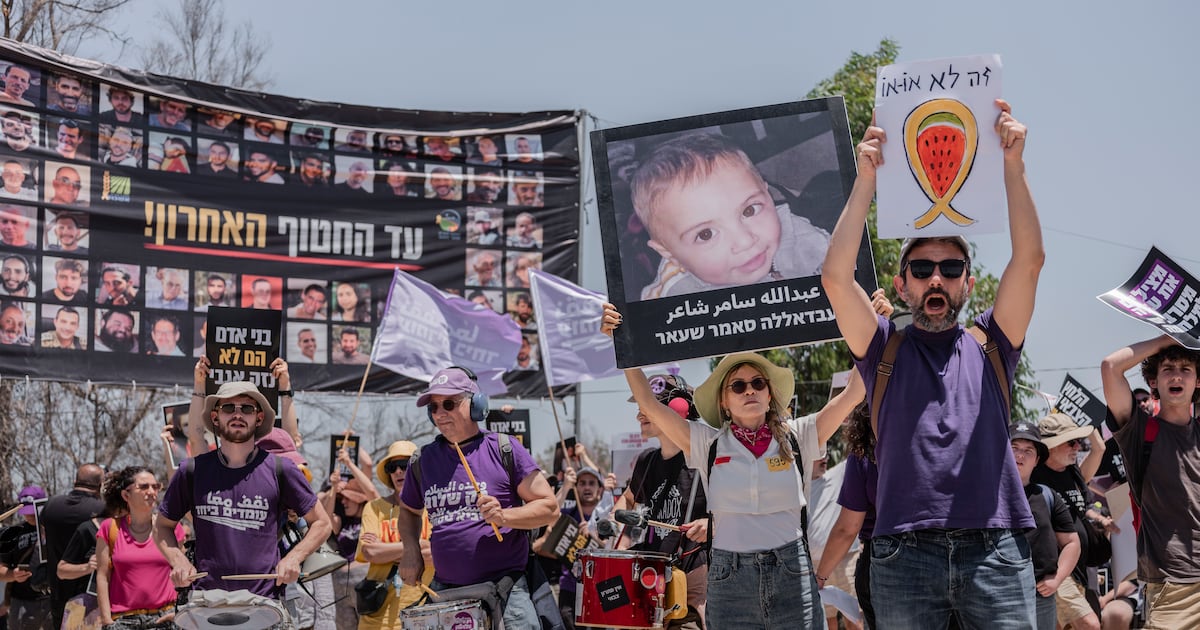World
Israeli Voices Challenge Government’s Actions in Gaza Conflict

The devastating conflict in Gaza has prompted a growing number of Israelis to voice their opposition to the government’s military actions. As protests gain momentum, many individuals are expressing their concerns over what they describe as atrocities committed in their name. This shift comes after months of overwhelming support for military operations following the Hamas-led attack on October 7, 2023, which resulted in the deaths of approximately 1,200 Israelis and the capture of around 250 hostages.
A wave of dissent is now emerging, with protesters holding portraits of Palestinian children who have lost their lives in Gaza. Academics, authors, politicians, and retired military figures are increasingly vocal in their accusations against the Israeli government of indiscriminate killing and potential war crimes.
Shifting Perspectives Among Israelis
Initially, the Israeli public largely viewed the military response as justified, even while expressing skepticism about the feasibility of the government’s long-term objective to eliminate Hamas. Polls indicated that many Israelis desired a resolution to the conflict, particularly in exchange for the release of hostages and relief for exhausted soldiers. Despite this sentiment, a smaller but increasingly prominent faction has begun to advocate for an end to the war on moral grounds.
Tamar Parush, a lecturer in sociology at Sapir College, articulated this sentiment during a recent anti-war protest near the Gaza border. “We are on the edge of the abyss,” she stated. “Revenge is not a policy. We could have fought a smarter war.” This perspective reflects a growing unease among those who once supported military action but now believe it contradicts their values.
The toll on Gaza has been staggering. According to health officials in the region, over 60,000 Palestinians have died since the onset of the conflict, including more than 10,000 children. The war has displaced millions, pushing the territory to the brink of famine, with reports of children succumbing to starvation and malnutrition.
Despite the humanitarian crisis, a survey conducted in May by the Institute for National Security Studies at Tel Aviv University revealed that 64.5 percent of Israelis were not particularly concerned about conditions in Gaza. Additionally, around three-quarters of Israeli Jews believed military strategy should minimally consider the suffering of Palestinian civilians. However, the Israel Democracy Institute noted a slight increase in those advocating for greater consideration of civilian suffering.
Emerging Voices of Dissent
The discourse surrounding the conflict is evolving. Lee Mordechai, a historian at the Hebrew University of Jerusalem, noted a discernible shift as more individuals speak out against the military actions. He pointed to a silent vigil held at the university, where participants carried portraits of children killed in Gaza, as indicative of this change.
Prominent figures have also begun to express their concerns. Former Prime Minister Ehud Olmert condemned what he described as the “cruel and criminal killing of civilians,” while former military chief Moshe Yaalon warned of ethnic cleansing. In a particularly controversial statement, Yair Golan, the former deputy chief of the military, suggested that the government was killing infants “as a hobby.”
The Israeli government has vehemently denied accusations of war crimes, asserting that its military operations comply with international law and that efforts are made to minimize civilian casualties. Nonetheless, the International Criminal Court has issued arrest warrants for Prime Minister Binyamin Netanyahu and former Defense Minister Yoav Gallant regarding the conflict.
Amid the ongoing violence, hundreds of reservists and retired officers from the Israeli air force signed an open letter urging the government to negotiate with Hamas for the return of hostages. The letter stated that continuing the war would not achieve any of its declared goals and would only result in further loss of life among hostages, soldiers, and civilians.
In a remarkable show of solidarity, approximately 140,000 Israelis from various professions have signed similar letters advocating for peace and equality. The grassroots organization Standing Together has been at the forefront of these anti-war protests, emphasizing the need for dialogue and a cessation of hostilities.
The mainstream media in Israel has faced criticism for its limited coverage of the humanitarian crisis in Gaza. While some outlets have highlighted the suffering, others have presented a narrative that often overlooks the plight of civilians and calls for harsher measures against them. Activists have staged protests outside major television networks, pushing for more comprehensive reporting on the dire conditions in Gaza.
The ongoing conflict has sparked a complex debate about national identity, morality, and the responsibilities that come with military action. As dissenting voices grow louder, many Israelis are grappling with the implications of their government’s actions, seeking to reconcile their sense of justice with the realities unfolding in Gaza.
In this challenging environment, the call for introspection and change resonates more strongly than ever, with many insisting that it is time to break the silence and confront the humanitarian crisis at hand.
-

 Top Stories3 months ago
Top Stories3 months agoTributes Surge for 9-Year-Old Leon Briody After Cancer Battle
-

 Entertainment4 months ago
Entertainment4 months agoAimee Osbourne Joins Family for Emotional Tribute to Ozzy
-

 Politics4 months ago
Politics4 months agoDanny Healy-Rae Considers Complaint After Altercation with Garda
-

 Top Stories4 months ago
Top Stories4 months agoIreland Enjoys Summer Heat as Hurricane Erin Approaches Atlantic
-

 World5 months ago
World5 months agoHawaii Commemorates 80 Years Since Hiroshima Bombing with Ceremony
-

 Top Stories3 months ago
Top Stories3 months agoNewcastle West Woman Patricia Foley Found Safe After Urgent Search
-

 Top Stories5 months ago
Top Stories5 months agoFianna Fáil TDs Urgently Consider Maire Geoghegan-Quinn for Presidency
-

 World5 months ago
World5 months agoCouple Convicted of Murdering Two-Year-Old Grandson in Wales
-

 World5 months ago
World5 months agoGaza Aid Distribution Tragedy: 20 Killed Amid Ongoing Violence
-

 World5 months ago
World5 months agoAristocrat Constance Marten and Partner Convicted of Infant Murder
-

 Top Stories4 months ago
Top Stories4 months agoClimbing Errigal: A Must-Do Summer Adventure in Donegal
-

 Top Stories4 months ago
Top Stories4 months agoHike Donegal’s Errigal Mountain NOW for Unforgettable Summer Views









